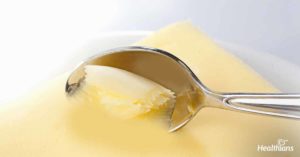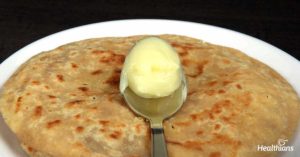Contributed by – Healthians Team
Since childhood, we have been advised by our grannies to have ghee for a healthy body. Ghee is not just good for health but is also the magical ingredient that amplifies the taste of each and every meal, let it be hot piping dal, parathas, pulao or veggies a dash of good old ghee makes everything yummier. Even though with its long list of goodness ghee has been considered bad for health by many.
Ghee had been misunderstood for a long time now, a lot of people believe that ghee is unhealthy. But thanks to the recent increase in awareness about foods ghee has regained the long-lost importance. Ghee has multiple health benefits and is packed with healthy nutrients when taken in moderation. Let us discuss some really important questions about ghee that can help clear a lot of doubts about the mighty ghee.

Who can have ghee?
The very question that troubles many, the much sought after answer is that everyone can have ghee. The amount of ghee consumed matters, the recommended quantity of ghee for everyday intake is 10-15 grams. But those suffering from any kind of cardiac problems or cholesterol should strictly refrain from overconsumption of ghee.
What kind of ghee is better?
Ghee is actually clarified butter that is made from milk. Ghee can basically be divided on the basis of the type of milk from which it’s produced. Ghee is mostly produced from cow and buffalo milk which gives us two types of ghee:
- Cow ghee
- Buffalo ghee
Cow milk is considered much better for daily consumption as it has low-fat content. Although with the same calorie content cow milk offers better absorption, thus it is highly recommended for good health.
How good is the processed ghee?
While purchasing processed ghee it is important to check for FSSAI (Food Safety and Standards Authority of India) mark to ensure the quality of ghee. Also, make sure to check the content list on the back of the pack to get an idea of the ghee that you are purchasing. It is best to try to make your own ghee at home.
Who should avoid ghee?
The important question is that who should try to avoid ghee. Nobody really needs to avoid ghee completely, controlled intake is the key. The recommended total oil intake for a person should be between 15-20 grams, of which ghee can be maximum amount to 10 grams.
People with cholesterol problems and cardiac problems or cardiac history should strictly control their ghee intake amounting to a maximum of 15 grams in a day. People who are really sick and bedridden should also comply with the mentioned limit.

Few interesting facts about ghee
Having ghee in raw form is actually better than cooking your meals in it. Start adding ghee goodness in your dal, veggies, spreading them over chapattis and paranthas. Let us enjoy the yummy health benefits of ghee.
When cooking with ghee make sure not to overcook the ghee. The burning of ghee produced a rancid smell and also reduces the health benefits of ghee.
The key to good health is in moderation. Overindulgence of anything can be bad. Ghee is really beneficial for health if taken in moderation so stay aware and reap the amazing health benefits of ghee.




